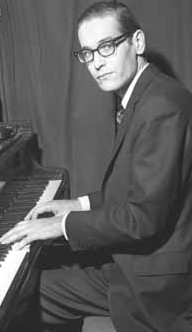| B i o g r a p h y |
 Bill Evans
was born in Plainfield, New Jersey on August 16, 1929 and began his
music studies at age 6. Classically trained on piano; he also studied
flute and violin as a child. He graduated with a degree in piano
performance and teaching from Southeastern Louisiana College (now
University) in 1950, and studied composition at Mannes College of Music
in New York. After a stint in the Army, he worked in local dance bands,
and with clarenetist Tony Scott, Chicago-area singer Lucy Reed and
guitarist Mundell Lowe, who brought the young pianist to the attention
of producer Orrin Keepnews at Riverside Records.
Bill Evans
was born in Plainfield, New Jersey on August 16, 1929 and began his
music studies at age 6. Classically trained on piano; he also studied
flute and violin as a child. He graduated with a degree in piano
performance and teaching from Southeastern Louisiana College (now
University) in 1950, and studied composition at Mannes College of Music
in New York. After a stint in the Army, he worked in local dance bands,
and with clarenetist Tony Scott, Chicago-area singer Lucy Reed and
guitarist Mundell Lowe, who brought the young pianist to the attention
of producer Orrin Keepnews at Riverside Records.
Evans' first album was New Jazz Conceptions in 1956, which featured
the first recording of his most loved composition, "Waltz for Debby".
It's follow-up, Everybody Digs Bill Evans was not recorded for another
two years; the always shy and self- deprecating pianist claiming he
"had nothing new to say." He gradually got noticed in the NYC jazz
scene, for his original piano sound and fluid ideas, when in 1958,
Miles Davis asked him to join his group (which also featured John
Coltrane and Cannonball Adderley) He stayed for nearly a year, touring
and recording, and subsequently playing on the all-time classic Kind of
Blue album - as well as composing "Blue in Green", now a jazz standard.
His work with Miles helped solidify Bill's reputation, and in 1959,
Evans founded his most innovative trio with the now-legendary bassist
Scott LaFaro and with Paul Motian on drums. The trio concept of equal
interplay among the musicians was virtually pioneered by Evans, and
these albums remain the most popular in his extensive catalog. They did
two studio albums together in addition to the famous 'live" sessions at
NYC's Village Vanguard in 1961. LaFaro's tragic death in a car accident
a few weeks after the Vanguard engagement - an event which personally
devastated Bill - sent the pianist into seclusion for a time, after
which he returned to the trio format later in 1962, with Motian again,
and Chuck Israels on bass.
His 1963 Conversations With Myself album , in which he double and
triple-tracked his piano, won him the first of many Grammy® awards
and the following year he first toured overseas, playing to packed
houses from Paris to Tokyo, now solidifying a worldwide reputation. The
great bassist Eddie Gomez began a fruitful eleven year tenure with Bill
in 1966, in various trios with drummers Marty Morell, Philly Joe Jones,
Jack DeJohnette and others - contributing to some of the most acclaimed
club appearances and albums in Evans's career. His recorded output was
considerable - (for Riverside, Verve, Columbia, Fantasy and Warner
Bros) over the years, and he also did sessions (especially early on)
with some of the top names in jazz. Musicians like Charles Mingus, Art
Farmer, Stan Getz, Oliver Nelson, Jim Hall, George Russell, Shelley
Manne, Toots Theielmans, Kai Winding /J.J. Johnson, Hal McKusick and
others all featured Evans. In the seventies, he recorded extensively-
primarily trio and solo piano now and then, but also including several
quintet albums under his own name as well two memorable dates with
singer Tony Bennett.
His last trio was formed in 1978, featuring the incomparably
sensitive Marc Johnson on bass and drummer Joe LaBarbera, which
rejuvenated the often-ailing pianist, who was elated with his new
line-up, calling it "the most closely related" to his first trio (with
LaFaro and Motian). He suffered yet more family problems and upheavals
in his personal life, (often due to bouts with narcotics addiction) and
yet brought a new dynamic musical vitality, a surer confidence, fresh
energy and even more aggressive interplay to the trio's repertoire.
Evans' health was deteriorating, however, though he insisted on working
until he finally had to cancel midweek during an engagement at Fat
Tuesday's in New York. He finally had to be taken to Mount Sinai
Hospital on September 15, 1980, where he died from a bleeding ulcer,
cirrhosis of the liver and bronchial pneumonia . He is buried next to
his beloved brother Harry, in Baton Rouge, Louisiana.
While Evans was open to new musical approaches that would not
compromise his musical and artistic vision - such as his occasional use
of electric piano, and his brief associations with avant-garde composer
George Russell - he always insisted on the purity of the song structure
and the noble history of the jazz tradition. It was a point the highly
articulate Evans was quite forthcoming about in the various interviews
he gave throughout his career. Consistently true to his own pianistic
standards, he continued to enhance his own singular vision of music
until the very end.
In his short life, Bill Evans was a prolific and profoundly creative artist and a genuinely compassionate and gentle man, often in the face of his recurring health problems and his restless nature. His rich legacy remains undiminished, and his compositions have enjoyed rediscovery by jazz players and even some classical musicians. Even twenty-five years after his passing, Bill Evans' music continues to influence musicians and composers everywhere and all those who have been deeply touched by his expressive genius and sensitive, lyrical artistry.
Homepage: www.billevanswebpages.com